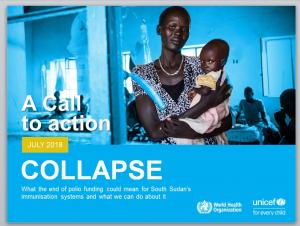South Sudan held a high level Polio Transition Advocacy and Resource Mobilization meeting to prevent the collapse of key immunization health system functions
Juba, 17 July 2018 – To ensure maintenance critical immunization system functions and prevent the collapse following the ramp down of the Global Polio Eradication Initiative (GPEI) support, the Ministry of Health with support from WHO held a one-day meeting with key donors and other stakeholders including UNICEF.
The objective of the meeting was to inform the participants on the status of the polio eradication, risks to achievements in the wake of transitioning polio funded assets and to collectively address the risks and seek commitments to support the key Immunization systems functions that will be affected.
In line with the fourth objective of the Polio Eradication Endgame strategy 2013-2018, the Ministry of Health with support from partners developed the polio transition plan which was endorsed by the Immunization Interagency Coordination Committee (ICC) on 26 of June 2018.
The 2018 - 2020 plan seeks to transition the polio funded assets to support the critical immunization services such as integrated disease surveillance and community mobilization through the Boma Health Initiative. However, without sustaining the functions from the Polio Programme, the immunization system is in danger of collapse and could lead to public health crisis in the region.
“To maintain the key functions and keep the country free of polio, we need adequate human and financial resources” said the Undersecretary, Dr Makur Matur Kariom representing the Honurable Minster of Health Dr Riek Gai Kok. He appealed to the donors to assist the country in replacing the funding that the country will be missing from the GPEI ramp down so that the country will be able to face the threat of polio from neighboring countries.
The estimated cost of the polio transition plan for the period 2018-2022 is US$ 105.9 million of which US$ 42.9 million of the funding available leading to a gap of about 59% (US$ 63 million).
“We have this opportunity to raise the national immunization coverage, improve and protect the health of millions of people before it gets worse,” says Mr Evans Liyosi, the WHO Representative a.i. for South Sudan. WHO is committed to supporting the Ministry of Health to be able to deliver health services including routine immunization and surveillance of vaccine preventable diseases in South Sudan but, without urgent funding, we cannot implement most of the planned interventions.
We need donors and partners to support the polio transition plan to avoid weakening the immunization and the surveillance system being built in this young nation while keeping it free of polio and improving routine immunization coverage”, Mr Liyosi underscored.
The polio legacy planning includes mainstreaming of essential polio functions into ongoing public health programs at the national and international levels, the transfer of lessons learnt to other relevant programs and/or initiatives, and transitioning assets and infrastructure to benefit other development goals and global health priorities.
At the end of the meeting, the stakeholders agreed to strengthen collaboration and identify long term approaches including: engaging policy makers to increase resources to address the underlying cause and invest for long term solutions.
Email: seruyanger [at] who.int (seruyanger[at]who[dot]int)
Tel: +211921702124
Tel : +211 927 296 042
Email: gargarm [at] who.int (gargarm[at]who[dot]int)
Communications Officer
Mobile: +211 921 647 859
Email: ebrahimj [at] who.int (ebrahimj[at]who[dot]int)



